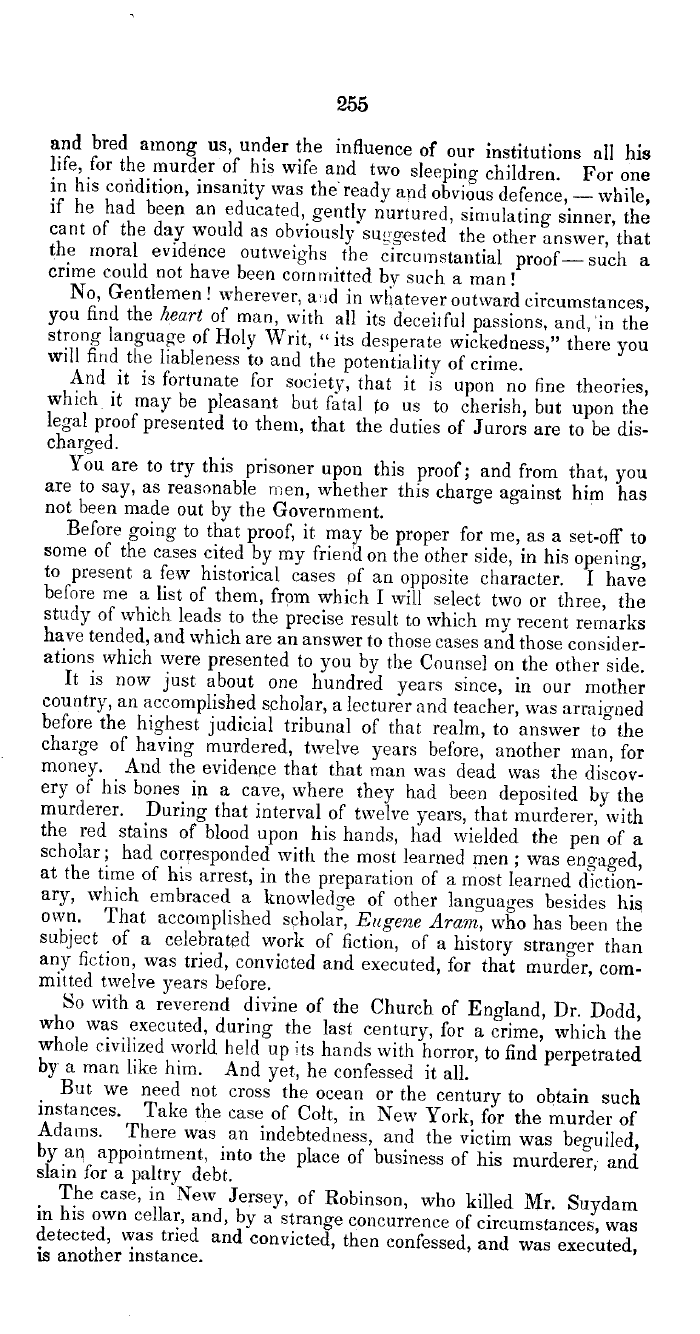|
255
and bred among us, under the influence of our institutions all his
life, for the murder of his wife and two sleeping children. For one
in his condition, insanity was the ready and obvious defence, - while,
if he had been an educated, gently nurtured, simulating sinner, the
cant of the day would as obviously s--gested the other answer, that
the moral evidence outweighs the circumstantial proof-such a
crime could not have been committed by such a man!
No, Gentlemen ! wherever, arid in whatever outward circumstances,
you find the heart of man with all its deceitful passions, and., 'in the
strong language of Holy Writ, 1° its desperate wickedness," there you
will find the liableness to and the potentiality of crime.
And it is fortunate for society, that it is upon no fine theories,
which it may be pleasant but fatal to us to cherish, but upon the
legal proof presented to them, that the duties of Jurors are to be dis-
charged.
You are to try this prisoner upon this proof; and from that, you
are to say, as reasonable rnen, whether this charge against him has
not been made out by the Government.
Before going to that proof, it may be proper for me, as a set-off to
some of the cases cited by my friend on the other side, in his opening,
to present a few historical cases of an opposite character. I have
before me a list of them from which I will select two or three, the
study of which. leads to the precise result to which my recent remarks
have tended, and which are an answer to those cases and those consider-
ations which were presented to you by the Counsel on the other side.
It is now just about one hundred years since, in our mother
country, an accomplished scholar, a lecturer and teacher, was arraigned
before the highest judicial tribunal of that realm, to answer to the
charge of having murdered, twelve years before, another man, for
money. And the evidenpe that that man was dead was the discov-
ery of his bones in a cave, where they had been deposited by the
murderer. During that interval of twelve years, that murderer, with
the red stains of blood upon his hands, had wielded the pen of a
scholar; had corresponded with the most learned men ; was engaged,
at the time of his arrest, in the preparation of a most learned diction-
ary, which embraced a knowledge of other languages besides his
own. That accomplished scholar, Eugene Aran, who has been the
subject of a celebrated work of fiction, of a history stranger than
any fiction, was tried, convicted and executed, for that murder, com-
mitted twelve years before.
So with a reverend divine of the Church of England, Dr. Dodd,
who was executed, during the last century, for a crime, which the
whole civilized world held up its hands with horror, to find perpetrated
by a man like him. And yet, he confessed it all.
But we need not cross the ocean or the century to obtain such
instances. Take the case of Colt, in New York, for the murder of
Adams. There was an indebtedness, and the victim was beguiled,
by an appointment, into the place of business of his murderer, and
slain for a paltry debt.
The. case, in New Jersey, of Robinson, who killed Mr. Suydam
in his own cellar, and, by a strange concurrence of circumstances, was
detected, was tried and-convicted, then confessed, and was executed,
is another instance.
|

